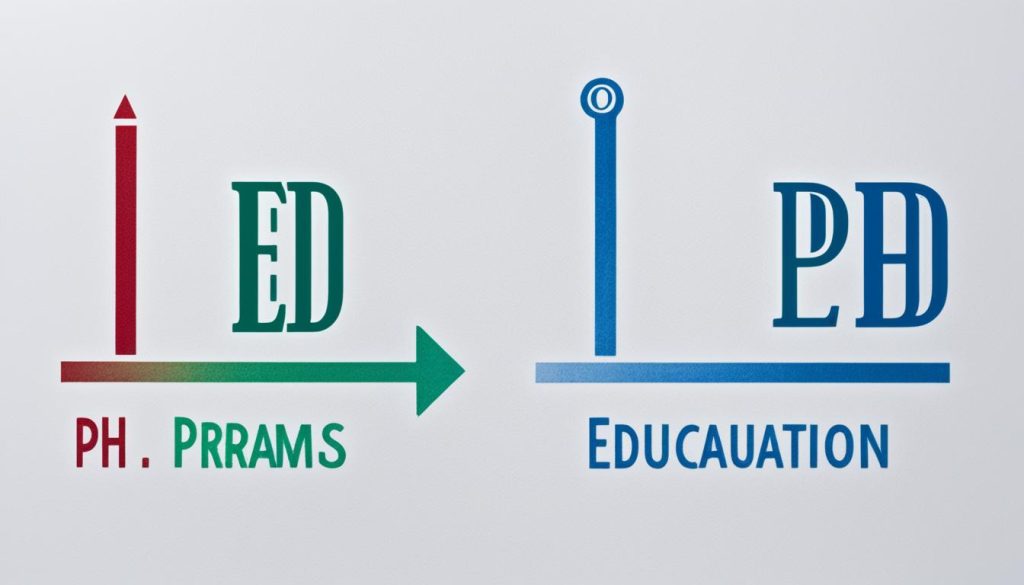Did you know that only 2% of the adult U.S. population holds a doctoral degree? Yet, these esteemed individuals have a significant impact in the field of education, with 10% of public school principals and over half of superintendents boasting a doctorate.
However, it’s concerning that the racial composition of doctoral degree earners does not reflect the diversity of the general population. Black and Hispanic Americans receive a significantly lower share of doctorates compared to their population share, highlighting the need for increased representation in these professions.
Affirmative action and diversity-focused interventions play a crucial role in addressing this disparity. By promoting diversity in doctoral degree programs, we can narrow the gap in representation and ensure a more equitable and inclusive education system.
So, which colleges and universities are offering diverse doctoral degree programs? Let’s dive deeper into the educational institutions that provide opportunities for individuals to pursue their academic aspirations.
Key Takeaways:
- Only 2% of the adult U.S. population holds a doctoral degree.
- Representation of underrepresented racial and ethnic groups in doctoral programs is significantly lower compared to their population share.
- Affirmative action and diversity-focused interventions are crucial in increasing diversity in doctoral degree programs.
- Promoting diversity in doctoral education contributes to a more equitable and inclusive education system.
- This article explores the educational institutions offering diverse doctoral degree programs.
Understanding the Difference between Ed.D. and Ph.D. in Education
When considering pursuing a doctoral degree in education, it’s essential to distinguish between the Ed.D. and Ph.D. programs. While both degrees offer advanced knowledge in the field, they differ in their focus and intended outcomes.
The Ed.D. in education, also known as the Doctor of Education, is a program that emphasizes practical application and research. It is designed to prepare individuals for leadership positions in educational settings. Ed.D. programs focus on equipping students with the skills necessary to address real-world challenges and implement effective strategies in educational organizations.
In contrast, the Ph.D. in education, or Doctor of Philosophy, is a research-oriented program. It primarily focuses on theoretical exploration and scholarly inquiry. Ph.D. candidates engage in original research, contribute to the existing body of knowledge in the field, and often pursue careers in academia or research institutions.
The program curriculum for an Ed.D. in education typically includes coursework in organizational leadership, policy analysis, and educational research methods. Students gain a comprehensive understanding of educational systems, develop leadership skills, and learn to address complex issues in educational settings. On the other hand, Ph.D. programs in education emphasize research methodologies, statistics, and theoretical frameworks. Students gain in-depth knowledge in a specific area of research and contribute to the advancement of knowledge in the field through their dissertations.
Considering career opportunities, an Ed.D. in education opens doors to a wide range of leadership positions in educational institutions, such as superintendent, principal, or higher education administrator. The focus on practical application equips graduates with the skills needed to navigate the challenges of educational leadership and enact meaningful change. Ph.D. graduates, on the other hand, often pursue careers in academia, conducting research, teaching, and mentoring future educators.
In summary, the choice between an Ed.D. and a Ph.D. in education depends on your career goals and interests. The Ed.D. is ideal for those seeking leadership positions in educational organizations, while the Ph.D. is well-suited for individuals interested in research and academia.
Program Curriculum Comparison
| Ed.D. in Education | Ph.D. in Education |
|---|---|
| Emphasizes practical application and leadership | Focuses on theoretical exploration and research |
| Courses in organizational leadership and policy analysis | Coursework in research methodologies and theoretical frameworks |
| Develops skills for addressing real-world challenges in education | Fosters the ability to conduct original research in the field |
Career Opportunities Comparison
| Ed.D. in Education | Ph.D. in Education |
|---|---|
| Leadership positions in educational organizations | Research and teaching positions in academia |
| Superintendent, principal, higher education administrator | University professor, research scientist, educational consultant |
Now that you have a better understanding of the differences between an Ed.D. and a Ph.D. in education, you can make an informed decision based on your career aspirations and academic interests.
Benefits of Earning an Ed.D. in Higher Education
Earning an Ed.D. in higher education offers numerous benefits that can advance your career and open up exciting opportunities. This advanced education degree equips you with the knowledge and skills needed to excel in administrative roles and make a meaningful impact in the field of education.
One of the key benefits of earning a doctoral degree in education is the ability to stay competitive in your field. The Ed.D. program provides in-depth knowledge and specialized training, allowing you to develop expertise in your targeted area of interest. This expertise sets you apart from others, making you a valuable asset in the ever-evolving landscape of higher education.
Additionally, earning an Ed.D. opens up a wide range of administrative roles for you to explore. With this advanced degree, you can pursue positions such as school principal, superintendent, director of education programs, or dean of a college or university. These leadership roles offer the opportunity to shape policies, implement innovative programs, and create positive change within educational institutions.
Completing an Ed.D. program also affords you the chance to conduct research and explore a specific area of interest. Your dissertation provides a platform to delve deep into a topic that you are passionate about. This research allows you to address social challenges, advance knowledge in your field, and contribute to the academic community.
Finally, earning an Ed.D. in higher education can lead to increased salary potential. With a doctoral degree, you become eligible for higher-level positions that often come with competitive compensation packages. Graduates with an Ed.D. typically earn a higher average salary compared to those with lower-level degrees, reflecting the value and expertise they bring to the field of education.
Benefits of Earning an Ed.D. in Higher Education:
- Stay competitive in your field
- Open up opportunities for administrative roles
- Explore a specific area of interest
- Address social challenges through research
- Increase salary potential
Earning an Ed.D. in higher education not only propels your career but also allows you to make a lasting impact on the education system. By acquiring an advanced education degree, you can become a leader, advocate for change, and drive innovation in the field. Take the next step towards your professional growth and consider pursuing an Ed.D. today.
| Ed.D | Ph.D. | |
|---|---|---|
| Program Focus | Practical application and research | Theoretical research |
| Curriculum | Prepares educational leaders and executives | Qualifies for research and teaching positions |
| Career Opportunities | Administrative roles in education | Professorships, research, and teaching positions |
| Research Focus | Applied research | Theoretical and original research |

Benefits of Earning a Ph.D. in Higher Education
Pursuing a Ph.D. in higher education offers numerous benefits that can greatly impact your career and personal growth. Whether you aspire to be a researcher, a professor, or a leader in the field of education, obtaining a Ph.D. can provide you with the necessary skills and opportunities to excel. Here are some of the key advantages of earning a Ph.D.:
1. Enhancing Research Skills
The Ph.D. journey involves extensive research, enabling students to develop advanced research skills that are essential for academic and professional success. By conducting in-depth research, analyzing data, and exploring existing knowledge gaps, Ph.D. students gain the expertise needed to contribute to the field and make a significant impact.
2. Preparing for Teaching Positions
A Ph.D. in higher education equips graduates with the knowledge and expertise to excel in teaching positions. Doctoral programs provide comprehensive training in pedagogy, curriculum design, and instructional strategies to prepare students for effective teaching in diverse academic settings. This prepares Ph.D. graduates to inspire and educate future generations of students.
3. Conducting Research in Your Area of Interest
One of the most exciting aspects of pursuing a Ph.D. is the opportunity to conduct research in your specific area of interest. Whether it’s exploring innovative teaching techniques, evaluating educational policies, or investigating social issues in education, a Ph.D. allows you to dive deep into your chosen field and contribute to its advancement. This enables you to make meaningful, original contributions to knowledge.
4. Making Original Contributions to Knowledge
As a Ph.D. student, you have the chance to make your own original contributions to knowledge. Through your research, you can discover new insights, challenge existing theories, and propose innovative solutions to complex educational problems. Your findings can have a lasting impact on the education community and help shape the future of the field.
5. Deep Exploration and Specialization
The pursuit of a Ph.D. allows for deep exploration and specialization in a specific area of study. By immersing yourself in a specific research topic, you can gain in-depth knowledge and expertise that distinguishes you as an expert in your field. This specialization opens up opportunities for collaboration, consulting, and leadership roles.
If you are passionate about advancing knowledge in the field of education, a Ph.D. can provide you with the necessary tools and opportunities to achieve your goals.

| Benefits of Earning a Ph.D. in Higher Education |
|---|
| Enhanced research skills |
| Preparation for teaching positions |
| Opportunity to conduct research in your area of interest |
| Making original contributions to knowledge |
| Deep exploration and specialization |
Similarities and Differences Between Ed.D. and Ph.D.
When exploring doctoral degrees in education, it’s important to understand the similarities and differences between an Ed.D. and a Ph.D. These degrees are the highest level of education in the field and offer unique paths for academic and career growth.
An Ed.D., or Doctor of Education, primarily focuses on practical application and research. It is designed to prepare individuals for leadership and executive roles in educational institutions. In contrast, a Ph.D., or Doctor of Philosophy, places a greater emphasis on theoretical research and qualifies graduates for research and teaching positions.
The curriculum for an Ed.D. program often includes coursework in leadership, policy analysis, and educational administration. Students gain the skills needed to address real-world challenges in the education sector. This practical approach allows Ed.D. programs to be completed in a shorter time frame compared to Ph.D. programs.
A Ph.D. in education delves deeper into theoretical research methodologies and analysis. Students pursue academic research projects and make original contributions to knowledge in their chosen area of expertise. This research-oriented approach allows Ph.D. graduates to contribute to the scholarly discourse in the field of education.
“An Ed.D. focuses on practical application and research, while a Ph.D. emphasizes theoretical research.”
Career paths for Ed.D. and Ph.D. graduates differ based on their program’s specific focus. Ed.D. holders often pursue leadership positions in educational institutions, such as school administrators, superintendents, or policymakers. On the other hand, Ph.D. graduates typically find opportunities in academia as professors, researchers, or educational consultants.
The choice between an Ed.D. and a Ph.D. depends on an individual’s desired career path, academic interests, and preferred approach to research and practice. Some individuals may value the practical application-oriented focus of an Ed.D., while others may be drawn to the research-intensive nature of a Ph.D.
Ed.D. vs. Ph.D.: A Comparison
| Ed.D. | Ph.D. |
|---|---|
| Practical and research-focused | Theoretical research-oriented |
| Prepares for leadership roles | Qualifies for research and teaching positions |
| Shorter completion time | Lengthier program duration |
| Careers in educational leadership | Opportunities in academia and research |
Both the Ed.D. and Ph.D. degrees in education offer valuable paths for academic and professional growth. Careful consideration of individual goals, interests, and career aspirations is crucial in choosing which degree aligns best with one’s desired career path and personal growth.

The Role of Professor Geneva Gay in Advancing Multicultural Education
Professor Geneva Gay has played a pivotal role in advancing the field of multicultural education throughout her distinguished career. As a renowned scholar and advocate, she has made significant contributions to the understanding and implementation of culturally responsive teaching.
Over the span of her 29-year tenure at the University of Washington College of Education, Professor Geneva Gay has emphasized the importance of multicultural education in today’s increasingly diverse society. Her research and scholarship have shed light on the critical need for educators to incorporate culturally relevant approaches in their teaching practices.
One of Professor Gay’s notable contributions is the concept of culturally responsive teaching. This teaching approach emphasizes leveraging the cultural knowledge and experiences of ethnically diverse students to enhance their learning experiences. By recognizing and valuing students’ cultural backgrounds, educators can create inclusive and empowering learning environments.
Through her influential publications and presentations, Professor Geneva Gay has not only raised awareness about the significance of multicultural education but also provided educators with practical strategies for implementing culturally responsive teaching. Her work has had a profound impact on the field, empowering educators to embrace diversity and foster inclusive learning environments.
| Contributions of Professor Geneva Gay |
|---|
| Championing multicultural education |
| Promoting culturally responsive teaching |
| Providing practical strategies for educators |
| Influencing the field through scholarly publications |
| Mentoring and inspiring future generations of educators |
Not only has Professor Geneva Gay made a significant impact through her research and scholarship, but she has also played a crucial role in mentoring and inspiring future generations of educators. She has nurtured numerous graduate students, encouraging them to make their own unique contributions to the field and further advance multicultural education.
As Professor Geneva Gay enters a new phase of her career, her legacy and influence on the field of multicultural education will continue to shape and guide the work of educators around the world. Her dedication to advancing culturally responsive teaching has paved the way for a more inclusive and equitable education system.

Conclusion
Creating a more equitable and inclusive education system relies on achieving diversity in doctoral degree programs. Although progress has been made, underrepresented racial and ethnic groups still encounter significant barriers in accessing and completing these programs. Recognizing the importance of diversity, targeted interventions, and affirmative action can play a crucial role in increasing representation and closing the gap.
It is imperative to continue promoting diversity in the education workforce to ensure that all students have access to culturally responsive teaching and diverse perspectives. By fostering a diverse education workforce, we can create an environment that values and celebrates the unique experiences and backgrounds of all students. This commitment to diversity can result in improved educational outcomes and a more inclusive society.
Closing the gap in doctoral degree diversity requires concerted efforts from educational institutions, policymakers, and communities. By prioritizing affirmative action and implementing strategies that support diverse student populations, we can ensure that all individuals have equal opportunities for advanced education. Through these collective efforts, we can build a brighter future with a truly diverse and inclusive education workforce.




No comments! Be the first commenter?